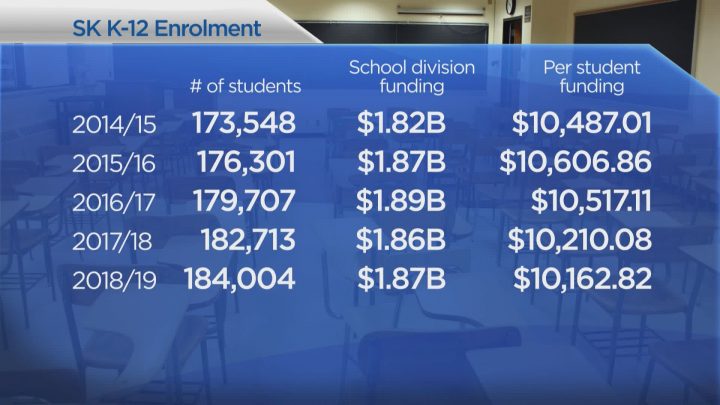In the Saskatchewan government’s three year plan to get back to balance, education funding has been a central topic over the past two years.

In the 2017-18 budget, classroom funding saw a $55 million reduction. Last year, $30 million was added – fulfilling a central promise in Premier Scott Moe’s leadership campaign.
The 2019-20 budget will be delivered on March 20. Finance Minister Donna Harpauer signalled funding in ministries like education is expected to see little change.
“We’re fairly confident that we’re going to be able to balance, and in order to do so – the importance of doing so – is so that we can maintain and sustain the level of spending that we have for education, social services and healthcare,” she said on Feb. 6, 2019.
Saskatchewan’s deficit sat at $348 million as of November.
The specifics of the education funding envelope will not be known until March 20, but the potential for a status quo budget does not sit well with the Saskatchewan Teachers’ Federation (STF).
“Status quo is a cut. We know that student enrolment continues to grow,” STF president Patrick Maze said.

Get breaking National news
The current school year saw an increase of 1,831 students compared to the 2017-18 school year, according to provincial records. Since the 2014-15 school year, Saskatchewan added 10,486 students.
Based on school division operating funds, this means provincial funding per student in 2018-19 is $10,162.82 compared to $10,210.08 the year prior. Using this formula, per student funding has dropped annually since the 2015-16 school year.
Harpauer has defended recent budgetary decisions around core services like education and social services, saying tough choices had to be made as revenue focus shifted from resource revenue to consumption taxes.
“Those budgets have been increased significantly even in the tight budgets, and so we’re hoping to keep that trend whole and provide the services our citizens expect,” Harpauer said.
However, Maze accused the government of not meeting its obligation to fund education. He said in recent years there has been a reduction in support positions and growth in class sizes.
“These supports are necessary and as enrolment increases substantially then support from government should also increase,” Maze said.
“Government has a responsibility to fund education and I’d argue that they’re shirking that responsibility.”
Maze added that a Saskatoon teacher told him last week that her class welcomed a new student from Vietnam who does not know English.
“That student requires immediate intervention. The difficulty is there really aren’t supports at the school level and the teacher is expected to do more with less, and the other students end up suffering,” Maze said.
“We need to be cognizant of the fact these supports are necessary and as enrolment increases substantially then the support from government should also increase.”
The province provides Saskatchewan’s 27 school divisions with a funding allotment each year, and the individual school boards determine how it is spent.









Comments
Want to discuss? Please read our Commenting Policy first.